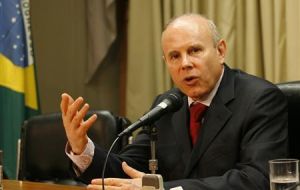MercoPress. South Atlantic News Agency
Brazil’s latest effort to stem flood of capital and contain the ‘Mighty Real’
 Mantega announces the new measures but analysts are not so sure
Mantega announces the new measures but analysts are not so sure Brazil unveiled Wednesday the latest effort to stem a flood of foreign capital that is driving the local currency sky-high and undermining the competitiveness of the country’s exports. Finance Minister Guido Mantega blamed the currency woes on the Federal Reserve policy that keeps US interest rates near zero.
Underscoring the urgency in senior levels in the Brazilian government to tackle the rising Real, during a prime time televised news conference Mr. Mantega announced the new measure: an extension of a 6% tax on short term foreign-currency loans to longer dated paper, from 360 to 720 days.
It was at least the fourth capital control introduced by Mantega since October.
The move came on a day when Brazil's currency threatened to break through a key psychological barrier of 1.60 Real per dollar, its highest since August 2008. The Brazilian real has climbed some 45% against the dollar since 2008, making it one of the world's strongest currencies.
Brazil's Real is soaring as foreign investment grows on optimism for the commodity-rich nation's growth prospects—and to cash in Brazil's 11.75% overnight interest rates, among the world's highest. The strong Real has hurt exporters by making their products less competitive abroad.
Brazil isn't the only emerging market nation struggling with a rising currency amid a rush of international investment. The International Monetary Fund took an unusual step this week in officially sanctioning capital control efforts such as Brazil's as short term ways to offset overseas currency pressure.
But capital controls haven't worked so far for Brazil. The currency is still rising, even though Mr. Mantega has already tripled taxes on foreign portfolio investment in local bonds in recent months as the central bank introduced its own measures to make it costlier for investors to speculate on currency rises and declines.
“Our currency would be even stronger now had we not introduced these measures,” Mr. Mantega said during the press conference, defending his policies. “All the measures we’ve taken have produced results” he added.
But economists say Brazil isn't tackling its biggest problem: The high interest rates that are attracting speculative capital in the first place. Economists say the quickest way for Brazil to bring its currency back to earth would be to cut spending, shrink the deficit and allow the central bank to start notching down interest rates.
Mr. Mantega announced a round of spending reductions earlier this year. But they haven't gone far enough to shrink the deficit and allow the central bank to lower rates, economists say. Indeed, the central bank has continued to raise rates, not lower them.
The Brazilian economy expanded 7.5% in 2010, the best in 20 years and is expected to grow 4% in 2011. But inflation is running at over 6% when the target is 4.5%. Brazil’s economy is expected to attract a record 55 billion USD in foreign direct investment this year according to central bank estimates.
Brazilian president Dilma Rousseff travels next week to China for a state visit and to attend a summit of BRIC leaders (Brazil, Russia, India and China). But President Rousseff is also expected to discuss with Chinese authorities the “flooding” of the Brazilian market with ‘cheap’ imports. China’s Yuan is pegged to the US dollar.




Top Comments
Disclaimer & comment rulesCommenting for this story is now closed.
If you have a Facebook account, become a fan and comment on our Facebook Page!